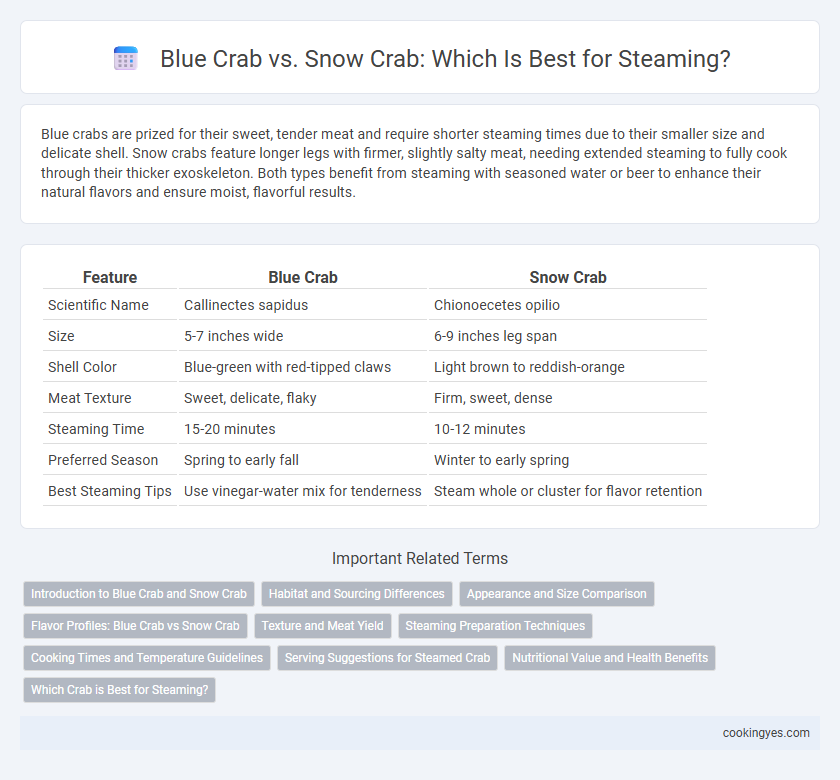Blue crabs are prized for their sweet, tender meat and require shorter steaming times due to their smaller size and delicate shell. Snow crabs feature longer legs with firmer, slightly salty meat, needing extended steaming to fully cook through their thicker exoskeleton. Both types benefit from steaming with seasoned water or beer to enhance their natural flavors and ensure moist, flavorful results.
Table of Comparison
| Feature | Blue Crab | Snow Crab |
|---|---|---|
| Scientific Name | Callinectes sapidus | Chionoecetes opilio |
| Size | 5-7 inches wide | 6-9 inches leg span |
| Shell Color | Blue-green with red-tipped claws | Light brown to reddish-orange |
| Meat Texture | Sweet, delicate, flaky | Firm, sweet, dense |
| Steaming Time | 15-20 minutes | 10-12 minutes |
| Preferred Season | Spring to early fall | Winter to early spring |
| Best Steaming Tips | Use vinegar-water mix for tenderness | Steam whole or cluster for flavor retention |
Introduction to Blue Crab and Snow Crab
Blue crab (Callinectes sapidus) inhabits the western Atlantic Ocean and Gulf of Mexico, known for its sweet, tender meat ideal for steaming. Snow crab (Chionoecetes opilio) thrives in cold North Atlantic and Pacific waters, featuring firm, flaky meat with a slightly sweet flavor perfect for steaming as well. Both species offer distinct textures and flavors, influencing steaming time and preparation techniques.
Habitat and Sourcing Differences
Blue crabs primarily inhabit the western Atlantic Ocean and the Gulf of Mexico, thriving in estuarine environments with brackish water, which influences their sweet and tender meat ideal for steaming. Snow crabs are found in colder, deeper waters of the North Atlantic and North Pacific Oceans, typically harvested through offshore trapping methods that yield firmer, slightly sweet meat suited for steaming as well. Sourcing blue crabs involves seasonal, often local catches from coastal regions, while snow crabs are generally sourced from commercial fisheries involving larger-scale offshore operations.
Appearance and Size Comparison
Blue crabs exhibit a vibrant blue-green shell and typically measure 5 to 9 inches across, while snow crabs feature a reddish-brown shell with long, slender legs and can reach leg spans up to 24 inches. The compact, rounded body of blue crabs contrasts with the elongated legs and smaller body of snow crabs, making size and shape key factors in steaming preparation. Blue crabs' smaller size allows for quicker steaming times, whereas snow crabs require longer cooking due to their larger leg size and thicker shells.
Flavor Profiles: Blue Crab vs Snow Crab
Blue crab offers a sweet, delicate flavor with a tender texture that is prized in steaming, imparting a rich, buttery taste. Snow crab features a slightly firmer meat with a mild, subtly sweet flavor and a hint of brininess, providing a clean and refreshing seafood experience. Both crabs deliver distinct taste profiles ideal for steaming, with blue crab favored for its richness and snow crab preferred for its crispness.
Texture and Meat Yield
Blue Crab offers a tender, sweet meat with a higher moisture content, resulting in a softer texture ideal for steaming. Snow Crab features firmer, denser meat with a lower yield but a more robust, slightly briny flavor profile. When steaming, Blue Crab typically provides more meat per crab, while Snow Crab's firmer texture holds up well to longer cooking times without becoming mushy.
Steaming Preparation Techniques
Blue crabs require thorough cleaning and often benefit from a quick blanch in boiling water before steaming to enhance flavor and maintain texture. Snow crabs should be steamed whole without pre-cooking to preserve their naturally sweet meat and delicate shells. For both crabs, maintaining a consistent steam temperature of 212degF and seasoning the water with sea salt or Old Bay seasoning optimizes taste and ensures even cooking.
Cooking Times and Temperature Guidelines
Blue crabs typically require steaming at 12-15 minutes over boiling water with a temperature of 212degF (100degC), while snow crabs need a slightly longer steaming time of 15-20 minutes at the same temperature. For optimal flavor and texture, maintain a consistent steam temperature of 212degF and avoid overcooking to prevent rubbery meat. Using a crab steamer basket ensures even heat distribution, allowing blue crab and snow crab to cook thoroughly within their recommended time frames.
Serving Suggestions for Steamed Crab
Serve steamed blue crab with melted clarified butter and a squeeze of fresh lemon to enhance its sweet, tender meat, often accompanied by corn on the cob and red potatoes for a classic Maryland-style feast. Snow crab, with its firmer, slightly sweeter flavor, pairs well with a zesty garlic butter sauce and a side of steamed asparagus or a crisp green salad to balance the rich taste. Both crabs are best served hot, allowing the natural flavors to shine while offering complementary dipping sauces like mustard vinegar or spicy remoulade to elevate the steaming experience.
Nutritional Value and Health Benefits
Blue crab offers a rich source of lean protein and essential minerals such as zinc, copper, and selenium, supporting immune function and antioxidant defense. Snow crab provides higher levels of omega-3 fatty acids, which promote heart health and reduce inflammation. Both types are low in calories and saturated fat, making them excellent choices for a nutritious steamed seafood meal.
Which Crab is Best for Steaming?
Blue crabs offer tender, sweet meat ideal for steaming due to their softer shells and delicate flavor, making them a favorite in coastal cuisine. Snow crabs, with their larger size and firmer, slightly sweeter flesh, require longer steaming times but yield ample, succulent meat perfect for hearty meals. Choosing between blue crab and snow crab for steaming depends on preference for texture and cooking duration, with blue crab favored for quick, flavorful dishes and snow crab preferred for substantial servings.
Blue Crab vs Snow Crab for steaming Infographic

 cookingyes.com
cookingyes.com